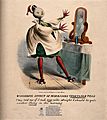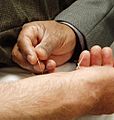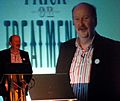Alternative medicine facts for kids
Quick facts for kids Alternative medicine |
|
|---|---|
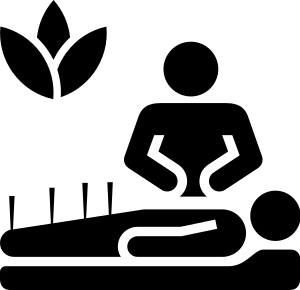 |
|
| Claims | Alternatives to reality-based medical treatments |
Alternative medicine refers to health practices that claim to heal like regular medicine. However, these practices often lack scientific proof. They might not be tested, cannot be tested, or have been shown not to work. Holistic medicine is another name sometimes used for alternative medicine.
Alternative therapies are different from standard medical science. They often rely on ideas that are not scientific, called pseudoscience. Some traditional healing methods become "alternative" when used without scientific reasons or proof.
Some alternative practices use ideas that go against how the human body is known to work. Others might use supernatural or superstitious beliefs to explain their effects. Sometimes, a practice might seem to work but has too many bad side effects.
Alternative medicine is not the same as experimental medicine. Experimental medicine uses the scientific method to test new treatments. This involves careful clinical trials to see if a treatment works or not.
Research on alternative therapies often does not follow proper scientific rules. For example, they might not use placebo-controlled trials or blind experiments. This can lead to results that are not reliable.
Many people feel better after using alternative practices because they believe it will work. This is called the placebo effect. Sometimes, a health problem gets better on its own, which can also make it seem like the alternative treatment worked.
The alternative medicine industry is very profitable. It often faces fewer rules about selling treatments that are not proven. Marketing for these treatments often says they are "natural" or "holistic". This is often compared to "big pharma," which refers to large drug companies. Billions of dollars have been spent studying alternative medicine, but very few positive results have been found.
Alternative therapies usually do not help standard medical treatments work better. In fact, some alternative therapies can cause problems with regular medicines. For example, some herbal products can make prescription drugs less effective.
Alternative medicine includes practices that involve spiritual or religious beliefs. It also includes practices that are not based on scientific evidence. Examples are non-European medical traditions or new healing methods.
Some common examples are acupuncture, chiropractic, naturopathy, ayurveda, reiki, shamanism, and homeopathy.
A Look at History
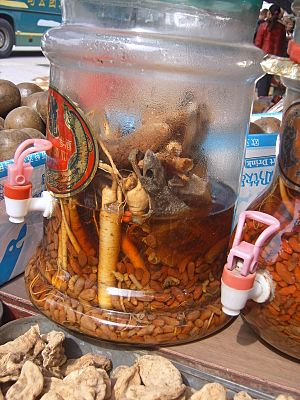
The use of alternative medicine in Western countries grew after the 1960s. This was part of the New Age movement that started in the 1970s.
People started using "alternative medicine" more because of misleading advertising. This advertising claimed these methods were effective "alternatives" to regular medicine. There were also changing ideas about not using chemicals and questioning authority. Patients also felt frustrated by the limits and side-effects of science-based medicine.
By the early 1970s, the term "alternative medicine" became widely used. It was marketed as a group of "natural" and effective treatments. These were presented as choices instead of science-based medicine.
Why People Choose Alternative Medicine
People sometimes want to avoid the painful or unpleasant side effects of regular medical treatments. Treatments for serious diseases like cancer and HIV can have strong side effects.
Even common medicines like antibiotics can cause problems for a few people. For example, they might cause a severe allergic reaction. Many medicines can also cause small but annoying symptoms like a cough or upset stomach. Because of these reasons, some patients look for alternative therapies.
In the UK, the National Health Service (NHS) supports some complementary and alternative medicines (CAM). The most common ones include acupuncture, aromatherapy, chiropractic, homeopathy, massage, osteopathy, and clinical hypnotherapy.
Images for kids
-
Acupuncture involves inserting needles into the body.
-
A chiropractor "adjusting" the spine.
-
Christian laying on of hands, prayer intervention, and faith healing.
-
Indian Ayurvedic medicine believes that a person's spiritual balance affects their health.
-
Shaman healer in Sonora, Mexico.
-
Phytotherapy (herbal medicine): an engraving of magnolia glauca in Jacob Bigelow's American Medical Botany.
See also
 In Spanish: Medicina alternativa para niños
In Spanish: Medicina alternativa para niños
 | Bessie Coleman |
 | Spann Watson |
 | Jill E. Brown |
 | Sherman W. White |



